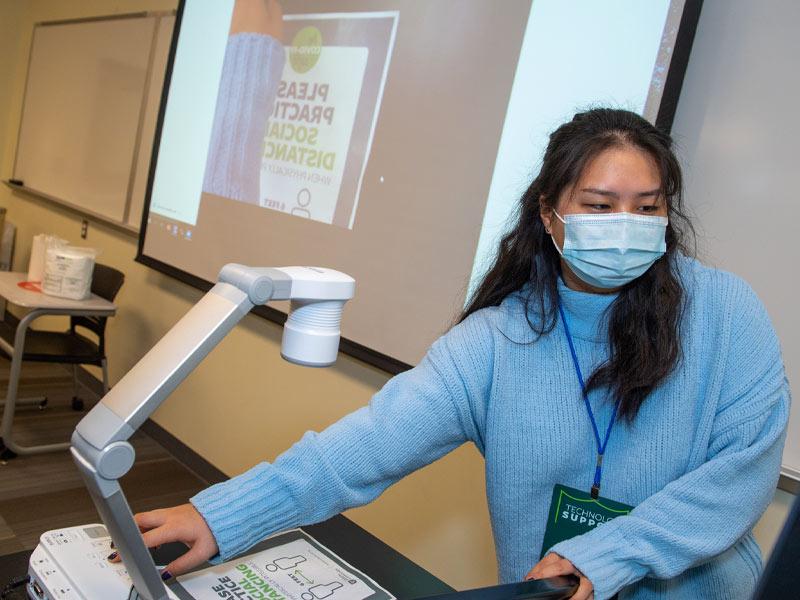Assistants who supported classroom technology during COVID-19 graduate
To help faculty continue Tulane’s teaching mission during the height of the COVID-19 pandemic, Tulane’s Information Technology Department created a student task force: the Classroom Experience Assistants (CEA), which employed up to 80 students.
Eleven of those students have remained with the CEA program for their four years at Tulane and are now set to join their fellow graduates at Commencement 2024. During their four years of service, CEAs helped to provide technology support in the classroom, online and through call centers.
Tulane’s COVID-19 preparations were comprehensive — with masks and social distancing — and technology was part of the answer. Tulane IT debuted new technology with cameras, microphones, projectors, dual displays, document cameras and more, enhancing the learning experience in over 180 classrooms. These tools were selected to support classes with a mix of in-person and remote students.
Faculty also adjusted to a new way of using technology in the classroom to accommodate both learning and safety.
The first line of support for faculty was the Classroom Support Hotline, a favorite role for CEA and management major Vishy Kandala.
“I loved being in the call center sophomore year with the other CEAs,” she said. “Once I had a 90-minute call from a professor.” The experience gave Kandala a new way of interacting with faculty.
The call center also dispatched other CEAs stationed in different buildings and zones around campus to classrooms that needed in-the-moment support. The CEAs would wear reflective neon vests to make them easily recognizable to faculty who wanted tech support.
Despite the spotlight of troubleshooting newly installed equipment in front of full classrooms filled with friends, many CEAs found purpose and silver linings in their roles. For instance, CEA and chemical engineering major Hailey Hayes said she loved watching the professors’ faces light up when they set up a Zoom to connect guest speakers or record lectures for sick students.
CEA and political science and French major Anjoli Bahle-Russell also pointed out how her participation in CEA put her in touch with professors she wouldn’t have normally interacted with, and let her get to know campus outside of where she personally had classes.
Once the CEAs were comfortable with the hybrid learning model, Hurricane Ida also prompted the need to test a fully remote model. After a brief shutdown to assess damage to the uptown campus, many Tulane staff returned to remote work, including some student staff. CEAs assisted in getting remote classes online by assisting professors via phone, Zoom and Microsoft Teams while also attending their own online classes.
Over time, the Tulane classroom experience is more predictable, with no social distancing or staggered start times. Since then, the CEA team has expanded its duties to include other support needs under the IT departmental umbrella.
CEAs still monitor the support hotline and provide one-on-one tech consultations, but now they also supervise the Pharos Printers at the Howard-Tilton Memorial Library, and some have been trained as the “Tulane Operator,” assisting the Telecommunications staff answering calls to the main Tulane phone line.
CEA and linguistics major Liv Tanaka-Kekai became one of the regular operators. “Working the operator line has made me realize how big of a community Tulane really is,” she said, noting that while it may seem like a small job, she was able to see the importance of helping parents and students navigate such a large institution.
Many CEAs said the program helped them develop a unique combination of interpersonal skills and technical knowledge that will be useful no matter their ultimate career field. The soon-to-be CEA alumni are graduating with degrees in linguistics, music, neuroscience, political science, French, chemical engineering, finance, history, international relations and more.
With their time at Tulane coming to a close, this CEA cohort’s reflections on their historic time at Tulane embody the university’s motto Non sibi, sed suis — “Not for one’s self, but for one’s own.”
These 11 2024 graduates have been CEAs throughout their four years at Tulane:
- Anjoli Bahle-Russell, Bachelor of Arts in political science and French
- Sedonia Davis, Bachelor of Science in neuroscience
- Brianna Harris, Bachelor of Arts in sociology
- Grace Harsche, Bachelor of Arts in international relations and social policy and practice
- Hailey Hayes, Bachelor of Science in engineering, chemical engineering
- Vishy Kandala, Bachelor of Science in management
- Sadie McLish, Bachelor of Arts in history and international relations
- Aim Niamnud, Bachelor of Science in neuroscience
- Ansen Shen, Bachelor of Science in management, finance
- Kate Springs, Bachelor of Arts in international development
- Liv Tanaka-Kekai, Bachelor of Arts in linguistics with a minor in music

